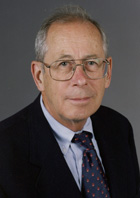P. James E. Peebles, Ph.D., one of the world’s foremost theoretical cosmologists who played a central role in understanding the evolution and structure of the universe, will deliver two talks April 15 and 16 as part of the McDonnell Distinguished Lecture Series, sponsored by the McDonnell Center for the Space Sciences.

Peebles, the Albert Einstein Professor of Science Emeritus at Princeton University, will give the McDonnell Lecture at 7 p.m. April 16 in Room 100, Brown Hall.
The talk is titled “Finding the Big Bang.” Peebles and two other scientists recently edited a book with the same title that Cambridge University Press published last month.
“Our universe is not forever: The evidence is that over the past several thousand million years it expanded and cooled from a much hotter denser state,” Peebles said.
“I will describe how people hit on the concept of an expanding universe, and the discovery of a fossil, thermal radiation left from the early hot stages of expansion, that shows the universe really did evolve from a very different condition,” Peebles said.
Peebles also will deliver a colloquium titled “Establishing the Big Bang” as part of the lecture series at 4 p.m. Wednesday, April 15, in Room 204, Crow Hall. A coffee reception will be held at 3:30 p.m. in Room 245, Compton Hall. All events are free and open to the public.
His studies of the evolution of matter in the earliest moments of the universe were critical in establishing the Big Bang theory as a widely accepted model, noted a May 2000 article in Princeton’s Weekly Bulletin.
In 2004, Peebles received the first Shaw Prize in Astronomy “for a lifetime of groundbreaking contributions to cosmology and astrophysics.”
The Shaw Prize, which bears an award of $1 million, honors individuals who have achieved a significant breakthrough in academic and scientific research or application and whose work has resulted in a positive and profound impact on mankind.
He was cited for laying “the foundations for almost all modern investigations in cosmology, both theoretical and observational, transforming a highly speculative field into a precision science.”
Among his many contributions, he predicted the existence of cosmic microwave background radiation, popularized the idea of “dark matter” and developed a theory of how the universe evolved into galaxies.
A native of St. Boniface, Manitoba, Canada, Peebles earned a bachelor of science degree from the University of Manitoba in 1958 and a doctorate in physics in 1962 from Princeton University.
After a three-year postdoctoral fellowship, he joined Princeton’s physics faculty and remained in the department throughout his career.
The McDonnell Center, which was established in 1975 through a gift from the aerospace pioneer James S. McDonnell, is a consortium of WUSTL faculty, research staff and students coming primarily from the Arts & Sciences departments of earth and planetary sciences and physics who are working on the cutting edge of space research.
For more information, contact Jan Foster at 935-5332 or janf@physics.wustl.edu.